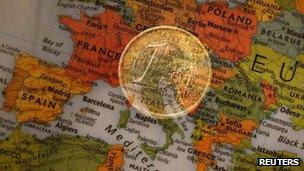Financial transactions tax in Europe given go-ahead
- Published

The tax is expected to be charged at a rate of one euro for every 1,000 euros of shares traded
EU ministers have given the go ahead for 11 eurozone members, including France and Germany, to prepare a new financial transactions tax.
The approval under "enhanced co-operation" rules allows the smaller group to pioneer the tax.
Governments previously failed to agree to impose the tax across the entire 27-member EU or 17-member eurozone.
The UK and 15 other EU members will not introduce the tax, which is intended to discourage speculative trading.
Some European governments have blamed speculators and excessive trading for exaggerating the swings in financial markets during the 2008 crash and the recent eurozone crisis.
"It is a milestone for EU tax policy, as it paves the way for more ambitious member states to progress on a tax file, even when unanimity could not be achieved," said Algirdas Semeta, the European Commissioner for tax.
"Those who want to move ahead, and who appreciate the merits of working more closely on taxation at EU level, can do so."
Tax avoidance
The tax - also known as a Tobin tax after the economist who originally came up with it 40 years ago - is expected to be charged at a rate of 0.1% of the value of any trade in shares or bonds, and 0.01% of any financial derivative contract.
Although the tax is not being adopted by the UK, which already charges its own 0.5% stamp duty on trading in shares, it will nonetheless have to be paid by investors trading on the London Stock Exchange who are based in one of the 11 countries.

Jeroen Dijsselbloem, the Eurogroup's new Dutch chair, supports the tax, but his country stayed out
The other nine going ahead with the tax are Spain, Portugal, Italy, Belgium, Austria, Slovakia, Slovenia, Greece and Estonia.
Agreement over the tax had already been reached before the meeting, and the nod from a majority of the Ecofin group of EU finance ministers - a requirement of the enhanced co-operation procedure - was merely a procedural matter, according to the Irish Finance Minister Michael Noonan.
It is only the third time the voting procedure has been used to enable a select group to go ahead with deeper integration, having previously been used for divorce and patents laws.
The Netherlands, which did not join the pioneer group on this occasion, had been strongly opposed to the transactions tax, but recently elected a new government.
The new Dutch Finance Minister, Jeroen Dijsselbloem, who was elected the new chair of the Eurogroup of eurozone finance ministers on Monday, is supportive of the measure.
Other eurozone countries that chose not to participate include Luxembourg and Cyprus, both of whom are significant offshore financial centres.
The UK and Sweden, while not opposed to the tax in principle, have both warned that it makes little sense unless it is applied globally, as investors will simply move their trading activity to a different country in order to avoid paying it.
It is not yet clear how the proceeds of the tax will be used, but one possibility is that they will be collected by the European Commission to finance a bailout fund for eurozone banks.